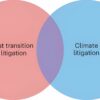Two articles being published in Science magazine’s influential Policy Forum this week argue for more and better social science research into the potential use of solar geoengineering to offset some of the global warming from greenhouse gases in the atmosphere.
In one article, David Keith, a professor at Harvard Kennedy School and Harvard’s Paulson School of Engineering and Applied Sciences, calls for building a shared taxonomy that researchers could use to separate the overlapping concerns and opportunities raised by solar geoengineering, or SG. Keith is regarded as an early leader in thinking about public policy choices for those considering this climate-altering technology.
Keith notes that experts diverge on SG more sharply than any other area of climate policy. “As with other contested technologies, disagreement sometimes conflates divergent scientific and political judgments with divergent normative stances,” he writes. “It is impossible to cleanly disentangle the technical, political, and ethical aspects of the debate.”
To make sure policy debates better reflect the public interest, Keith suggests disaggregating the concerns about SG with the goal of “more constructive disagreement.”
Solar geoengineering, also known as solar radiation management, refers to interventions that could reflect sunlight, and thus reduce some climate hazards caused by greenhouse gases, through measures such as releasing stratospheric aerosols. SG is one of four main approaches to respond to climate change, along with emissions reduction, carbon removal, and adaptation.
In a companion paper, Kennedy School Professor of the Practice of Public Policy Joseph E. Aldy joins Keith and 19 other climate scholars in calling for more thorough social science research into SG, given the growing interest in this techniques a policy option to cool the planet. They point out that “the physical and social science literature on SG remains modest compared with mitigation and adaptation.”
They argue for pursuing three research themes to advance policy-relevant social science related to SG:
Assessing and quantifying the costs and benefits of SG, and the potential for risk-risk trade-offs associated with its use. Understanding the “political economy of deployment,” including the incentives for unilateral deployment and the potential multilateral governance of SG decision-making. Evaluating how SG may fit in a portfolio of policies, such as emission mitigation, and adaptation, to combat climate change, including closer study of public and expert perceptions of SG.
Aldy, who previously served as a special assistant to President Obama on climate policy, and his co-authors from universities and research centers around the world, call for scholars from developing countries to be involved in this process. “The consideration of the justice implications of climate policy can be richer and more credible through a more inclusive approach in undertaking research and the production of evidence,” they write.
Keith, too, raises concerns about potential injustices flowing from the research, development, and deployment of SG. He argues that injustice should be one of the central research themes for scientists and policymakers alike as they plot climate change strategies.
Keith says the research agenda also needs to address the potential for what he calls “the physical harms of benevolent deployment” of SG, including risks of accidents and chances for disparate local effects. A related concern is that of “moral hazard,” or the risk that if SG were successful, it may weaken the resolve of political leaders to implement emission-cutting policies, raising the potential costs of climate action for future generations. Aldy and his colleagues emphasize, however, that the opposite could occur—SG deployment could galvanize public support for more ambitious emission reductions—and highlight this topic as one warranting further examination.
Keith argues further that SG researchers should study the potential for malevolent use of SG, including weaponization of weather control. And he wants researchers to consider the risks of the use of SG to tailor climate to benefit some people rather than to reduce climate changes.
Disentangling and building data on these complex factors could lead toward more constructive debate, Keith says. This approach could take the form of a community-based taxonomy of SG concerns, which would be seen as unbiased if it followed a Wikipedia-style set of rules where substantive statements point to peer-reviewed literature.
“Analysis of SG is oversupplied with generic normative claims about governance and undersupplied with detailed empirical research to understand the mental models of relevant groups,” Keith argues.
Climate engineering no longer on the fringe
More information:
David W. Keith, Towards more constructive disagreement about solar geoengineering, Science (2021). DOI: 10.1126/science.abj1587. www.science.org/doi/10.1126/science.abj1587
Joseph Aldy, Social science research to inform solar geoengineering, Science (2021). DOI: 10.1126/science.abj6517. www.science.org/doi/10.1126/science.abj6517
Provided by
Harvard University
Citation:
In Science magazine, scholars call for more comprehensive research into solar geoengineering (2021, November 11)
retrieved 15 November 2021
from https://phys.org/news/2021-11-science-magazine-scholars-comprehensive-solar.html
This document is subject to copyright. Apart from any fair dealing for the purpose of private study or research, no
part may be reproduced without the written permission. The content is provided for information purposes only.



